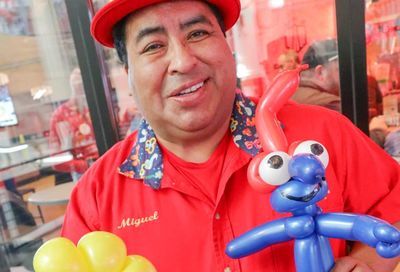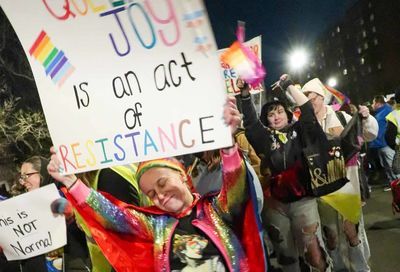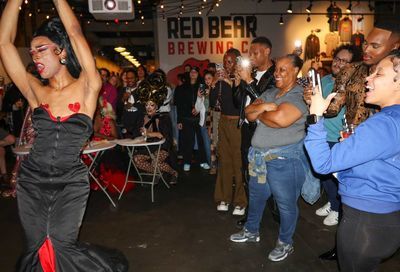The Opposite of Albert
Janet McTeer's performance as Hubert in ''Albert Nobbs'' is informed by the actor's own sense of happiness and self-contentment
McTEER: I wanted Hubert to look like Hubert was still a man in drag. I personally found it funny the idea that she would dress as a man essentially in drag, and then when you put Hubert in a dress, she would still look like she’s in drag. It just appealed to my sense of humor hugely. It was hysterical and yet somehow we then had to try and make it poignant.
MW: I’d like to hear your thoughts on one of the movie’s unanswered questions: Do you think Hubert told Kathleen that she was a woman before or after marrying her?
McTEER: Oh, definitely before. Because I don’t think Hubert’s a deceptive person. I think probably they became great friends and I think probably Hubert fell in love with her and then there was a moment when Hubert realized that Kathleen was falling in love with Hubert and I’m sure, because Hubert is just too nice, Hubert would have said, ”I have to tell you, I’m a girl, I’m not a boy.” And it was fine, and then they got married.
MW: The film clearly deals with issues of gender identity and lesbianism, but it does so in an almost nondescript way.
McTEER: The film exists in a time before labels. We can all say, ”Oh, I’m straight, I’m gay, I’m transgender, I’m transsexual, I’m something else, I’m something else.” We have labels for everything. And I think that it was in a time before labels when nobody ever particularly spoke about it, certainly not women living as men — I think that was pretty rare. There were a few documented cases and of course, there must have been a lot more than we know about, but really not that many.
You can look at Albert and say, ”Well, what is Albert?” I personally think Albert was kind of asexual, and whether that’s because Albert had such a horrific past or whether it’s because Albert is in fact a gay woman or you know, somebody who prefers to live as a man, I have absolutely no idea. And I’m not even sure that Hubert knew, because in the scene after the dress, when Hubert says to Albert, “You have a right to be who you are, and if you want to find somebody to love, go out and find that person. You’re a really good catch” — within that there is no pronoun, there is no ”her,” no ”go and find her” or “find him.” None. Hubert doesn’t judge, and I think that is so spectacularly ultramodern. I love her. Of course, in a utopian society that’s where we’d all be.
Who cares? Who cares as long as it’s all about love? That’s what I tell the kids in my family. Who cares? It doesn’t matter if girls love girls and boys love boys. Who cares as long as you all love each other? That’s all that matters, really.
MW: Well, unfortunately, there are a lot of people who care — or, rather, make it their business to care, often in a negative way.
McTEER: Well, that’s one of the reasons why I wanted Hubert to be rounded and live happy. Is it partly a minor political statement? Of course it is. You make choices when you create a character and I wanted Hubert to be a spectacularly happy human being. I’ve been asked if it’s a lesbian movie, is it a transgender movie, and I go, ”They existed in a time before labels. It has no label.” That’s the whole point. One shouldn’t have to label oneself in this day and age or that day and age. It’s a story about battered women, one of whom becomes spectacularly happy, one of whom ends up very pregnant and you know, completely abandoned. It was a time of awfulness. And the characters rose above it. And that’s ultimately what it’s about, and finding peace with yourself. I think that’s pretty awesome whatever your social preference.
MW: You’re also featured in the fifth season of Damages, which you’re currently shooting. What’s it like working with Glenn Close?
McTEER: Just great. We’ve become very good friends in the time since she first brought me into the film, which is over two years ago now. She is deceptively not what you would imagine, if you only know her from her work. She is tiny, first off. She’s played all of these hugely massive characters, very important, really powerful characters. And in real life she’s about 4’9” and very sweet and very cuddly and pretty and is just always laughing and smiling. She’s an absolute delight.
And she’s also a perfectionist — which I also am. Once she gets on the [set], she’s just another working actress. She doesn’t pull any starry shit. She just does her job and she does it to the best of her ability. We talked about the character of Hubert quite a lot, and she was completely open to whoever had the best idea. She wasn’t precious about this. She wanted the film to be the best it could be and if your idea was better than hers, fine. And that takes great openness. And she and I both enjoy doing jigsaw puzzles and drinking Guinness, both of which we did quite a lot in Ireland, let me tell you.
Support Metro Weekly’s Journalism
These are challenging times for news organizations. And yet it’s crucial we stay active and provide vital resources and information to both our local readers and the world. So won’t you please take a moment and consider supporting Metro Weekly with a membership? For as little as $5 a month, you can help ensure Metro Weekly magazine and MetroWeekly.com remain free, viable resources as we provide the best, most diverse, culturally-resonant LGBTQ coverage in both the D.C. region and around the world. Memberships come with exclusive perks and discounts, your own personal digital delivery of each week’s magazine (and an archive), access to our Member's Lounge when it launches this fall, and exclusive members-only items like Metro Weekly Membership Mugs and Tote Bags! Check out all our membership levels here and please join us today!






















